Here's To Doubting Thomases
Crispin Sartwell [2022-02-02]
 From ministers preaching funeral sermons for suicide victims and recounting stories of their despair while praising their god for its intervention to those who believe their god wants them to crash airliners into buildings even as others thank their god for helping some of them escape from the same, there's always going to be that someone at the back of the crowd saying, "Huh?"
From ministers preaching funeral sermons for suicide victims and recounting stories of their despair while praising their god for its intervention to those who believe their god wants them to crash airliners into buildings even as others thank their god for helping some of them escape from the same, there's always going to be that someone at the back of the crowd saying, "Huh?"
Things You Shouldn't Say To An Atheist
James C. Rocks [2021-07-07]
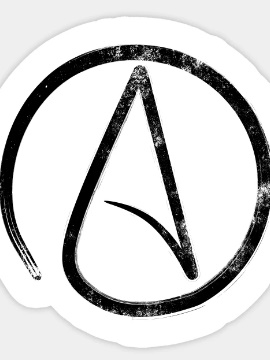 I have been debating creationists and fundamentalists for the best part of thirty years (since the early nineties) and in my online life, I have been asked some really daft questions as well as been subject to some equally daft accusations. This article deals with some of them and gives reasonably concise answers to them.
I have been debating creationists and fundamentalists for the best part of thirty years (since the early nineties) and in my online life, I have been asked some really daft questions as well as been subject to some equally daft accusations. This article deals with some of them and gives reasonably concise answers to them.
The Physics of Santa Claus
Unknown [2020-12-24]
 I'm a geek, an atheist and [somewhat] pro-science but I still love Christmas so is it any surprise that I love humorous pieces like this one? It's arguably one of my all-time favourite pieces of Christmas fun. Bear in mind this was first published way back before the millennium so some of the figures are a little dated; for example, there are probably around two and half billion children in the world today compared to a mere two billion back then.
I'm a geek, an atheist and [somewhat] pro-science but I still love Christmas so is it any surprise that I love humorous pieces like this one? It's arguably one of my all-time favourite pieces of Christmas fun. Bear in mind this was first published way back before the millennium so some of the figures are a little dated; for example, there are probably around two and half billion children in the world today compared to a mere two billion back then.
Was There A Real Jesus?
James C. Rocks [2020-10-05]
 There exists precious little verifiable evidence for the existence of the Christian messiah, Jesus Christ, and that which does exist is at best anecdotal with much of it flawed and presumed fake. My assumption is that Jesus Christ never existed because there is no specific need for a real messiah to form the root of the Christian myth since common traits with pre-existing religions suggest aspects of the character, if not the whole, to be based on earlier myth rather than a real person. This article explains my current reason for taking the stance I do.
There exists precious little verifiable evidence for the existence of the Christian messiah, Jesus Christ, and that which does exist is at best anecdotal with much of it flawed and presumed fake. My assumption is that Jesus Christ never existed because there is no specific need for a real messiah to form the root of the Christian myth since common traits with pre-existing religions suggest aspects of the character, if not the whole, to be based on earlier myth rather than a real person. This article explains my current reason for taking the stance I do.
The Essential Beliefs Of Christianity
James C. Rocks [2020-09-23]
 I think it's fair to say that religions generally request, often demand, respect from us all as if they believe we should believe their views are in some way the equal of those that accept science as the focus of discovery and explanation.How about Christianity?
I think it's fair to say that religions generally request, often demand, respect from us all as if they believe we should believe their views are in some way the equal of those that accept science as the focus of discovery and explanation.How about Christianity?
Hampshire Freethinkers
Ben Slythe [2020-05-04]
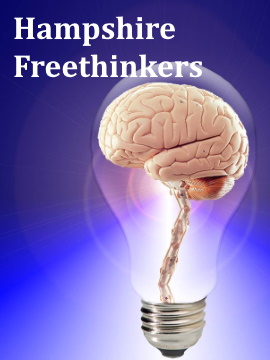 In England, near the town of Ringwood, there is a secret camp. Nestled into a secluded part of the New Forest, protected from even airborne prying eyes by dense foliage and a locked gate, sentries patrol to discourage people on foot. Dozens of serious-looking people, men and women, mostly in their late twenties, walk quietly between clean huts. They are the vanguard of the atheist terrorism movement.
In England, near the town of Ringwood, there is a secret camp. Nestled into a secluded part of the New Forest, protected from even airborne prying eyes by dense foliage and a locked gate, sentries patrol to discourage people on foot. Dozens of serious-looking people, men and women, mostly in their late twenties, walk quietly between clean huts. They are the vanguard of the atheist terrorism movement.
Religion Is For People Who Need Support
Unknown [2019-12-31]
 How do the lyrics go? "So, this is Christmas and what have you done? Another year over, a new one just begun." It's worth thinking about. What have you done? Why do we even do Christmas? Don't get me wrong, I like Christmas; it's a season when people are generally nicer to each other, a time when people give each other gifts, there's good company, good food and the demon drink. Religion just gets in the way! This blog post was written by someone I don't know but is interesting nevertheless.
How do the lyrics go? "So, this is Christmas and what have you done? Another year over, a new one just begun." It's worth thinking about. What have you done? Why do we even do Christmas? Don't get me wrong, I like Christmas; it's a season when people are generally nicer to each other, a time when people give each other gifts, there's good company, good food and the demon drink. Religion just gets in the way! This blog post was written by someone I don't know but is interesting nevertheless.
For The Betterment Of Mankind?
James C. Rocks [2019-10-30]
 Are we humans really as special as we think we are? Is mankind really worth saving? This is a question, especially in light of recent societal and political developments that has got me thinking. Don't get me wrong, I think there are plenty of people out there who are nice but I have to wonder if being "nice" is enough and these days the level of hatred, especially online hatred, is enough to make one throw one's hands in the air and walk away in disgust muttering, "Bah, humans! Really not worth the effort!"
Are we humans really as special as we think we are? Is mankind really worth saving? This is a question, especially in light of recent societal and political developments that has got me thinking. Don't get me wrong, I think there are plenty of people out there who are nice but I have to wonder if being "nice" is enough and these days the level of hatred, especially online hatred, is enough to make one throw one's hands in the air and walk away in disgust muttering, "Bah, humans! Really not worth the effort!"
Faith Healing
James C. Rocks [2019-09-29]
 When I am ill, I go to a doctor because they are more qualified than I am in the areas relevant to my health. It would be fair to say that I consider the medical profession the authoritative guide to medical issues. That said, I welcome the medical professions cautious acceptance of some "alternative" medicines or therapies. Enter the faith healer, one who claims to use spiritual powers to cure ills without medical intervention.
When I am ill, I go to a doctor because they are more qualified than I am in the areas relevant to my health. It would be fair to say that I consider the medical profession the authoritative guide to medical issues. That said, I welcome the medical professions cautious acceptance of some "alternative" medicines or therapies. Enter the faith healer, one who claims to use spiritual powers to cure ills without medical intervention.
Freedom Of Speech
Ben S [2019-09-10]
 In our more liberal countries, there is much comment on human rights. Which rights are, to coin a phrase, 'inalienable' and which are assigned by laws? It took civilisation to instil them into the fabric of society. If rights are dependent entirely upon the society in which a person lives, that means that there could be somewhere with no rights for its citizens at all, a different culture, with different standards and rules.
In our more liberal countries, there is much comment on human rights. Which rights are, to coin a phrase, 'inalienable' and which are assigned by laws? It took civilisation to instil them into the fabric of society. If rights are dependent entirely upon the society in which a person lives, that means that there could be somewhere with no rights for its citizens at all, a different culture, with different standards and rules.
Flat Earth Encounter
James C. Rocks [2019-08-03]
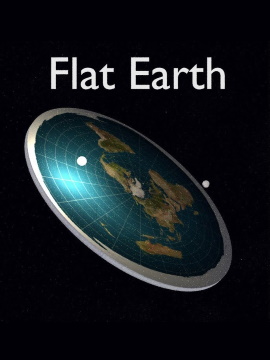 I thought Flat-Earthers were something one only saw on the internet but one day (it must have been a year ago) my best friend and I actually met one; that's right, a real, honest-to-god, plain as the hand in front of my face and the beer it was holding, Flat Earther. To say I was shocked was an understatement, but, bit by bit, I scrabbled back my dignity and helped put the critter down where he belonged.
I thought Flat-Earthers were something one only saw on the internet but one day (it must have been a year ago) my best friend and I actually met one; that's right, a real, honest-to-god, plain as the hand in front of my face and the beer it was holding, Flat Earther. To say I was shocked was an understatement, but, bit by bit, I scrabbled back my dignity and helped put the critter down where he belonged.
No, I'm Not Broken!
James C. Rocks [2016-05-01]
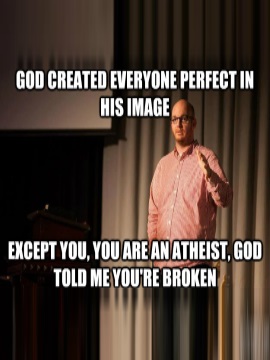 I am an atheist and pretty damned proud of being one! I like that I don't subscribe to anyone's particular way of thinking. Of course, like anyone else, I am influenced by views I hear or read but I believe I think about those things and decide whether or not they make any sense. Whether I use it or not all the time, I believe I have the ability to think critically ... that's why I am a fan of science, why I am an atheist and, more recently, why I am not a Brexiter. I like to think of it as an alarm bell, a bullshit-o-meter that goes off whenever I think something doesn't feel or smell right.
I am an atheist and pretty damned proud of being one! I like that I don't subscribe to anyone's particular way of thinking. Of course, like anyone else, I am influenced by views I hear or read but I believe I think about those things and decide whether or not they make any sense. Whether I use it or not all the time, I believe I have the ability to think critically ... that's why I am a fan of science, why I am an atheist and, more recently, why I am not a Brexiter. I like to think of it as an alarm bell, a bullshit-o-meter that goes off whenever I think something doesn't feel or smell right.
A Personal Relationship With God
James C. Rocks [2018-03-19]
 If I had a dollar for every time a theist has tried to tell me we atheists can't understand their relationship with god I'd be ... well I wouldn't actually be rich but I'd probably be able to buy my family a decent curry and several beers each. Suffice to say, it's a common claim but it's also wrong and here's why.
If I had a dollar for every time a theist has tried to tell me we atheists can't understand their relationship with god I'd be ... well I wouldn't actually be rich but I'd probably be able to buy my family a decent curry and several beers each. Suffice to say, it's a common claim but it's also wrong and here's why.
Why I Celebrate Christmas
James C. Rocks [2016-13-15]
 Over twenty years ago, an ex-colleague of mine (who had turned out to be a creationist, the first I have ever met) got into an email discussion where, after making a number of typically unsupportable assertions, aggressively asked me why I, an atheist, celebrated Christmas.
Over twenty years ago, an ex-colleague of mine (who had turned out to be a creationist, the first I have ever met) got into an email discussion where, after making a number of typically unsupportable assertions, aggressively asked me why I, an atheist, celebrated Christmas.
Genesis and The Big Bang
James C. Rocks [2016-10-15]
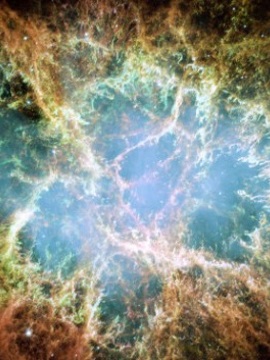 Fundamentalists will often use the argument attempt to claim that the bible and science are compatible in that Genesis can be interpreted as predictive of modern-day scientific knowledge. The implications of such a claim, were it to be demonstrated as true would be immense ... whilst it would not automatically demonstrate the bible as being correct from cover to cover it would certainly lend it a great deal of credence.
Fundamentalists will often use the argument attempt to claim that the bible and science are compatible in that Genesis can be interpreted as predictive of modern-day scientific knowledge. The implications of such a claim, were it to be demonstrated as true would be immense ... whilst it would not automatically demonstrate the bible as being correct from cover to cover it would certainly lend it a great deal of credence.
The Passion of The Christ
James C. Rocks [2016-09-01]
 I genuinely had no intention of going to see Gibson's "The Passion of the Christ". Several people had opined on how bad (gory, violent, bloody) the film was and I did not want to contribute to the coffers of Mr Gibson whose then behaviour I had been viewing with some alarm. The offer of free tickets by some local churches apparently aware and happy that many of those applying for them were atheist or agnostic changed that and both I and a friend set off to see it.
I genuinely had no intention of going to see Gibson's "The Passion of the Christ". Several people had opined on how bad (gory, violent, bloody) the film was and I did not want to contribute to the coffers of Mr Gibson whose then behaviour I had been viewing with some alarm. The offer of free tickets by some local churches apparently aware and happy that many of those applying for them were atheist or agnostic changed that and both I and a friend set off to see it.
Evolution and Immorality
James C. Rocks [2016-08-15]
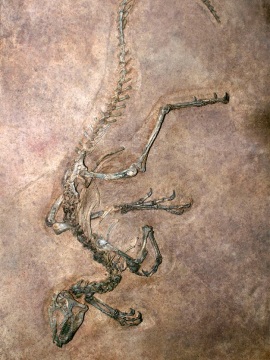 Young Earth creationists, attempting to disprove any theory that disputes their belief that the Earth & universe were divinely created, often use arguments that attempt to demonstrate theories opposing theirs as immoral. Darwin's theory of Evolution (or Neo-Darwinism as it known today) is claimed to be the cause of violence, racism and other forms of immoral behaviour.
Young Earth creationists, attempting to disprove any theory that disputes their belief that the Earth & universe were divinely created, often use arguments that attempt to demonstrate theories opposing theirs as immoral. Darwin's theory of Evolution (or Neo-Darwinism as it known today) is claimed to be the cause of violence, racism and other forms of immoral behaviour.
Science Versus Truth
James C. Rocks [2016-08-01]
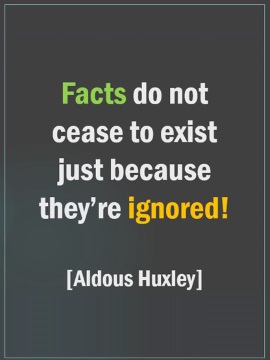 Science is an ongoing attempt to explain the universe and in this respect, is attempting to explain all that is observable. Science is not absolute and the rational minded would not claim so or that it has the absolute answer to anything. So, what is truth? Truth is something which is absolutely correct, without doubt, and the polar opposite of something which is not true.
Science is an ongoing attempt to explain the universe and in this respect, is attempting to explain all that is observable. Science is not absolute and the rational minded would not claim so or that it has the absolute answer to anything. So, what is truth? Truth is something which is absolutely correct, without doubt, and the polar opposite of something which is not true.
Sharia Law
Ben S [2016-07-15]
 I have always had a fairly tolerant attitude towards pretty much everything, part of being a liberal at heart, so I have generally felt that religion needed to be tolerated just as long as it didn't actually do anything inherently divisive. The example I always used was that of the Church of England. Anglicanism in the UK has always been the village-fête faith. The tombola faith. The bingo faith.
I have always had a fairly tolerant attitude towards pretty much everything, part of being a liberal at heart, so I have generally felt that religion needed to be tolerated just as long as it didn't actually do anything inherently divisive. The example I always used was that of the Church of England. Anglicanism in the UK has always been the village-fête faith. The tombola faith. The bingo faith.
Ghosts and Out-Of-Body Experiences
James C. Rocks [2016-07-01]
 Are ghosts real and are people's claims to out-of-body experiences genuine? An entire media culture, books, films and TV are devoted to such things, indeed, the basis of almost all religions is that an important part of us is the ghost-like spirit, soul or daemon. In my not-so-humble opinion, it is ludicrous to believe in such things as there isn't a shred of validatable evidence ...
Are ghosts real and are people's claims to out-of-body experiences genuine? An entire media culture, books, films and TV are devoted to such things, indeed, the basis of almost all religions is that an important part of us is the ghost-like spirit, soul or daemon. In my not-so-humble opinion, it is ludicrous to believe in such things as there isn't a shred of validatable evidence ...
Has Satan Been Given A Fair Chance?
James C. Rocks [2016-06-15]
 So, I was wondering about Satan. You know, the little red angry guy with the horns and off around the world corrupting it 'n all that and I started wondering. I mean, has the guy really been given a chance? We're told he lives in a place called hell which is where we all go if we don't follow "da roolz" after we're dead but if we do (follow "da roolz") we're good and off we po to some place called Heaven. I mean, do we? I mean, is this bloke Satan really all that bad?
So, I was wondering about Satan. You know, the little red angry guy with the horns and off around the world corrupting it 'n all that and I started wondering. I mean, has the guy really been given a chance? We're told he lives in a place called hell which is where we all go if we don't follow "da roolz" after we're dead but if we do (follow "da roolz") we're good and off we po to some place called Heaven. I mean, do we? I mean, is this bloke Satan really all that bad?
Why I Defend Science!
James C. Rocks [2016-06-01]
 Science represents our best effort to understand the universe around us and, regardless of whether the understanding it engenders is used for good or ill, that knowledge is a good thing. I want the human race to reach as high as we can. I want us to leave this lonely planet in this far-flung corner of what may well be a lonely galaxy and throw ourselves outwards exploring and finding out more about the universe. IMO, the further we throw ourselves the greater we ensure our survival.
Science represents our best effort to understand the universe around us and, regardless of whether the understanding it engenders is used for good or ill, that knowledge is a good thing. I want the human race to reach as high as we can. I want us to leave this lonely planet in this far-flung corner of what may well be a lonely galaxy and throw ourselves outwards exploring and finding out more about the universe. IMO, the further we throw ourselves the greater we ensure our survival.
Why I Am An Atheist
James C. Rocks [2016-05-01]
 I am an atheist. I'm proud of being what I am because, to my mind, it implies a certain amount of intelligent consideration of the issues surrounding religions and their claims. However, I don't usually start discussions on atheism or religion because of what I am ... more often than not, something or someone will bring up the subject. That's in public but mostly it's online where I have frequently been as to why it is, I am an atheist.
I am an atheist. I'm proud of being what I am because, to my mind, it implies a certain amount of intelligent consideration of the issues surrounding religions and their claims. However, I don't usually start discussions on atheism or religion because of what I am ... more often than not, something or someone will bring up the subject. That's in public but mostly it's online where I have frequently been as to why it is, I am an atheist.
Why I Am Anti-Faith
Unknown Author [2016-04-15]
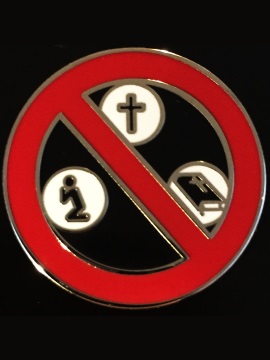 We've all heard the stories. A guy's down in the dumps, life's shot, no money, no future, in pain from some sort of medical problem that he can't afford to have fixed, probably in trouble for some reason or another beyond that… and then, one day, that person finds God. It's from such ideas that the comfort of the "salvation" story seems to arise.
We've all heard the stories. A guy's down in the dumps, life's shot, no money, no future, in pain from some sort of medical problem that he can't afford to have fixed, probably in trouble for some reason or another beyond that… and then, one day, that person finds God. It's from such ideas that the comfort of the "salvation" story seems to arise.
A Hospice for the Mind
Ben S [2016-04-01]
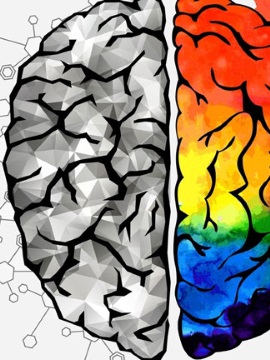 A recent poll suggests that Americans see religion as increasingly important in their lives. Another shows numbers visiting British churches are on the rise for the first time in decades. However, this is interpreted, the sheep are clearly flocking. It seems the reason is far from shrouded in obscurity, on this occasion there is no movement in mysterious ways, it is caused by the change in attitude following the atrocity of the eleventh of September 2001.
A recent poll suggests that Americans see religion as increasingly important in their lives. Another shows numbers visiting British churches are on the rise for the first time in decades. However, this is interpreted, the sheep are clearly flocking. It seems the reason is far from shrouded in obscurity, on this occasion there is no movement in mysterious ways, it is caused by the change in attitude following the atrocity of the eleventh of September 2001.
A Good God?
James C. Rocks [2016-02-15]
 In 2002 two young British girls went missing from the house of one of their parents. As a father of two young (at the time) girls, I followed the story to its inevitable conclusion with the girl's bodies being found in shallow graves near an airbase in Surrey and a couple in their home village being arrested for their murder.
In 2002 two young British girls went missing from the house of one of their parents. As a father of two young (at the time) girls, I followed the story to its inevitable conclusion with the girl's bodies being found in shallow graves near an airbase in Surrey and a couple in their home village being arrested for their murder.
"The Jesus Mysteries", Timothy Freke & Peter Gandy
James C. Rocks [2016-02-01]
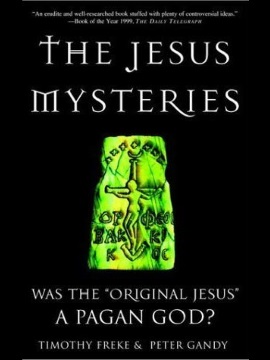 Despite being an atheist, I had always accepted the existence of a man called Jesus Christ as actual but Freke and Gandy's "Jesus Mysteries" forced me to re-evaluate my view. Although I did not believe Jesus was the son of any god, I had envisaged him a s real, perhaps a Jewish leader, perhaps a "freedom-fighter", perhaps wise, perhaps soft-spoken and the kind of man around which legends are built ... a kind of early-day Robin Hood if you like. In their book, the authors reveal the mystery religions, whose various dying & resurrecting godmen they refer to as "Osiris-Dionysus", as showing a great degree of similarity in their multi-level teachings that were interpreted more literally by the uninitiated and allegorically by the initiated.
Despite being an atheist, I had always accepted the existence of a man called Jesus Christ as actual but Freke and Gandy's "Jesus Mysteries" forced me to re-evaluate my view. Although I did not believe Jesus was the son of any god, I had envisaged him a s real, perhaps a Jewish leader, perhaps a "freedom-fighter", perhaps wise, perhaps soft-spoken and the kind of man around which legends are built ... a kind of early-day Robin Hood if you like. In their book, the authors reveal the mystery religions, whose various dying & resurrecting godmen they refer to as "Osiris-Dionysus", as showing a great degree of similarity in their multi-level teachings that were interpreted more literally by the uninitiated and allegorically by the initiated.
When Will We Learn?
James C. Rocks [2016-01-01]
 September the 11th, 2001 felt like a turning point for the world. Yes, we'd had terrorism before, but never (it seemed) such a catastrophic and appallingly planned one it would seem as well as one that played out, with its bloody aftermath, on TV in front of us all.We laughed when we heard a plane had struck the World Trade Centre, why shouldn't we have done? It wasn't real! Just some daft amateur we thought. We were so very, very wrong!
September the 11th, 2001 felt like a turning point for the world. Yes, we'd had terrorism before, but never (it seemed) such a catastrophic and appallingly planned one it would seem as well as one that played out, with its bloody aftermath, on TV in front of us all.We laughed when we heard a plane had struck the World Trade Centre, why shouldn't we have done? It wasn't real! Just some daft amateur we thought. We were so very, very wrong!
Open-Mindedness
James C. Rocks [2015-11-15]
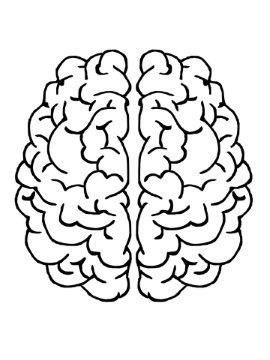 Have you ever been cynical of someone's opinion and have them tell you, you should be more open-minded? What they usually mean by that is that you should be more willing to accept their opinion or their version of events regardless of how much sense it makes, of how rational a view, a claim, it actually is. The really important question is, should you?
Have you ever been cynical of someone's opinion and have them tell you, you should be more open-minded? What they usually mean by that is that you should be more willing to accept their opinion or their version of events regardless of how much sense it makes, of how rational a view, a claim, it actually is. The really important question is, should you?
The Human Pinnacle
Bethnewt [2015-11-01]
 Many people believe that evolution proceeds by changing organisms slightly, so that species can be lined up to form a gradual series that shows complexity slowly increasing. This view was once held by most biologists but has since been discarded. However, it has been dumpster-dived by creationists seeking materials for straw-man representations of evolutionary theory. Evolution actually takes the form of a branching family tree. Stephen Jay Gould calls ladders and bushes "the wrong and right metaphors respectively for the topology of evolution"
Many people believe that evolution proceeds by changing organisms slightly, so that species can be lined up to form a gradual series that shows complexity slowly increasing. This view was once held by most biologists but has since been discarded. However, it has been dumpster-dived by creationists seeking materials for straw-man representations of evolutionary theory. Evolution actually takes the form of a branching family tree. Stephen Jay Gould calls ladders and bushes "the wrong and right metaphors respectively for the topology of evolution"
Atheists in Foxholes
Ben S [2015-10-01]
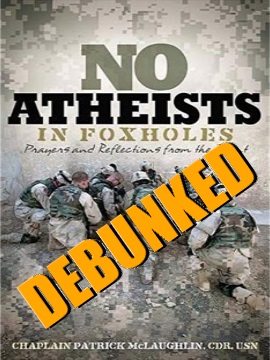 An oft-quoted saying, certainly I have encountered it many times, goes: "There are no atheists in foxholes." This is supposed to indicate that an atheist will, if placed into a life and death situation, turn to some deity or other for assistance. Well let's put some perspective onto the quote, shall we?
An oft-quoted saying, certainly I have encountered it many times, goes: "There are no atheists in foxholes." This is supposed to indicate that an atheist will, if placed into a life and death situation, turn to some deity or other for assistance. Well let's put some perspective onto the quote, shall we?
The Perfect Designs of God
James C. Rocks [2015-09-01]
 Creationists and those favouring intelligent design often point to us, to the complexity, the perfection & the sheer improbability of the world around us in order to justify their view that there must be a designer for the universe, but is this viewpoint fully justifiable?
Creationists and those favouring intelligent design often point to us, to the complexity, the perfection & the sheer improbability of the world around us in order to justify their view that there must be a designer for the universe, but is this viewpoint fully justifiable?
"Why Elephants Have Big Ears" by Chris Lavers
James C. Rocks [2015-08-01]
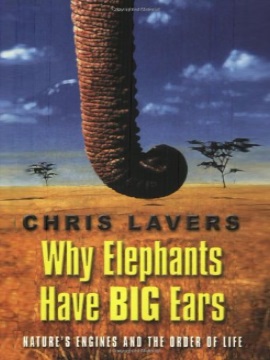 A brilliantly written popular science book that explains how evolution can create the staggering variety it has, whether dinosaurs were warm or cold blooded, why cinematic monsters such as King Kong and Godzilla are laughably impossible, why the marsupials kept control of Australia, why insects are so small. Finally, he explains why, despite our apparent superiority, we really don't own the world at all, that there is no such thing as a superior or dominant lifeform on the planet. He also explains why, of course, elephants do have big ears.
A brilliantly written popular science book that explains how evolution can create the staggering variety it has, whether dinosaurs were warm or cold blooded, why cinematic monsters such as King Kong and Godzilla are laughably impossible, why the marsupials kept control of Australia, why insects are so small. Finally, he explains why, despite our apparent superiority, we really don't own the world at all, that there is no such thing as a superior or dominant lifeform on the planet. He also explains why, of course, elephants do have big ears.
What Is Evidence?
James C. Rocks [2015-07-01]
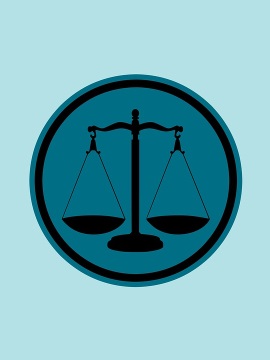 Once upon a time, debating in a forum (those things that used to be so popular before the advent of social networking) and following my usual strategy of demanding evidence for various claims, I was asked to define evidence. You could have smacked me down with a wet kipper! I hadn't actually given any real thought to it beyond pretty much knowing what it was. Still, an answer was expected and, as is usually the case when debating evangelists, involved a lot more work than their usual strategy of picking holes in established theory.
Once upon a time, debating in a forum (those things that used to be so popular before the advent of social networking) and following my usual strategy of demanding evidence for various claims, I was asked to define evidence. You could have smacked me down with a wet kipper! I hadn't actually given any real thought to it beyond pretty much knowing what it was. Still, an answer was expected and, as is usually the case when debating evangelists, involved a lot more work than their usual strategy of picking holes in established theory.
"River Out Of Eden" by Richard Dawkins
James C. Rocks [2015-04-01]
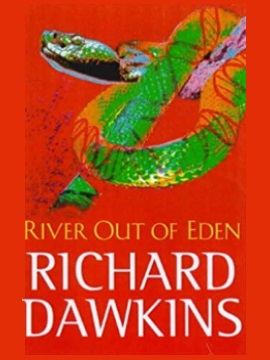 In "River Out Of Eden", Dawkins writes of a universe with no apparent design or purpose and explains more of our evolutionary past. With thorough knowledge and captivating style, Dawkins illuminates how life has achieved what to the uneducated or bigoted appear to be miracles. Science journal 'Nature' says, "It abounds with metaphors that make things brilliantly clear, an excellent introduction to many important evolutionary ideas"
In "River Out Of Eden", Dawkins writes of a universe with no apparent design or purpose and explains more of our evolutionary past. With thorough knowledge and captivating style, Dawkins illuminates how life has achieved what to the uneducated or bigoted appear to be miracles. Science journal 'Nature' says, "It abounds with metaphors that make things brilliantly clear, an excellent introduction to many important evolutionary ideas"
Religion and Morality
James C. Rocks [2015-03-01]
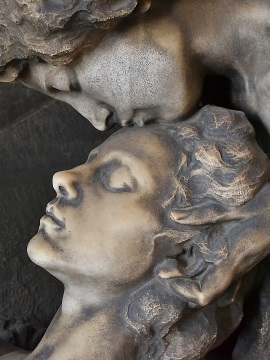 Young Earth creationists, believing the Earth & universe were divinely created, use arguments attempting to show other ideas as immoral and Neo-Darwinism the cause of violence, racism and other forms of immoral behaviour. They favour arguments citing communist Russia, Nazi Germany and others. It is interesting to look at religions' records on human rights and abuses before one starts a comprehensive defence of such charges and that is what this article attempts to do.
Young Earth creationists, believing the Earth & universe were divinely created, use arguments attempting to show other ideas as immoral and Neo-Darwinism the cause of violence, racism and other forms of immoral behaviour. They favour arguments citing communist Russia, Nazi Germany and others. It is interesting to look at religions' records on human rights and abuses before one starts a comprehensive defence of such charges and that is what this article attempts to do.